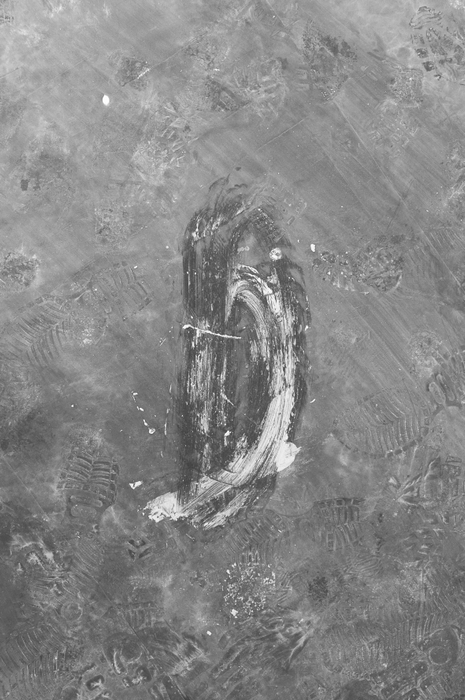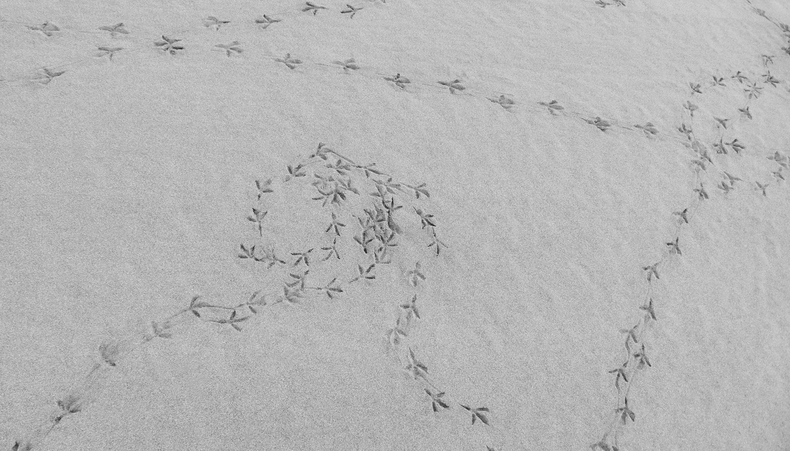Cao Guimarães just turned 50 last January. The date and a new book on his work from publisher Cosac Naify have motivated the artist from Minas Gerais, Brazil to cast an eye on his past works, especially the leftovers, the ones that didn’t make it into his official pieces. The outcome of this retrospective look is 5th solo show, "depois", at the Galeria Nara Roesler headquarters in São Paulo from April 07 to June 06, 2015. The book, titled Cao, will be launched during the exhibition opening.
The starting point for the exhibition was the Úmido, comprising four photos of plants on the floor with moisture halos from past rains around them. It’s a good synthesis for the imagery the exhibit conjures: that which remains, which stays after something or someone is gone. “It’s the memory of the gesture, the remnant, what remains. They’re nuances of what happened in that place,” says the artist. Of all the works in the exhibit, the Úmido series is the only one that was ever shown. But not in Brazil: the photos were on display in the latest edition of Miami Art Basel.
Four other sets of photos will take up the anterior part of the annex space at Galeria Nara Roesler in São Paulo, all alluding to the floor, and all featuring signs of human presence that is no more. They also share a heavily graphic character, a meeting with an unforeseen beauty.
“I found many of these materials lying among scraps of films, of photos that I gathered throughout my career. It’s a sign of the times: since I work in audiovisual, I cast aside stuff that I don’t include in my works. On seeing them again, I realized that they carried an aesthetical intention, a gaze that, albeit somewhat unconsciously, paid attention to a formal identity, to the beauty of images.”
Works created especially for the exhibition include the Steps series, composed of 14 B&W photographs of the footprints of construction workers. The pictures were printed on a black tarp, which was also used to hold lime dust released by wall sanding. The contrast between the white dust and the black background shows what would otherwise be imperceptible: the action of men through their steps and gestures.
Another series, Plano de Vôo, shows a pattern that resembles lace, a piece of fabric, formed by numerous footprints of birds on the dark sand of a beach. The series contains four photographs that were part of Guimarães’ archives, as were the three photos in another untitled series whose shared formal characteristic is the sinuosity of the elements they portray: the tracks left by a slug, the reflection of a thin strand of water seen on a puddle on dirt, and a pubic hair on a parquet floor.
Yet another set of archives is the Sonho de Bebê (Baby’s Dream) series, a quadriptych of Super 8 stills showing aerial sights of the São Francisco River. Through the poor image definition stemming from the grainy film, as opposed to the cold sharpness of digital media, Cao Guimarães drew a parallel with the shapes that possibly populate the imaginations of babies, still devoid of fixed images of the things of the world.
This quality of perspective and the grainy quality of Super 8, with its retro-like visuality, also provides the ambience for the video that will be shown in the back of the annex room. Two images alternate in an endless loop, with subtle changes in color and pace: the shadow of a woman’s hair on the wall, and the ebb and flow of waves seen from above. “What gets accentuated here is the wavelike relationship between the hair and the ocean,” the artist explains.
For this exhibition, Cao Guimarães, a filmmaker and visual artist, surrounds himself with the surfaces that beings record their existence on, unbeknownst to them. “The floor and wall are, par excellence, the apparatuses with which to record human presence.” In the formal similitudes between different testimonies of absence, he finds the beauty that gives new dimension to small gestures and commonplace events. His take on life values the minutest instants, aware as he is that time constitutes itself from ephemerality.
about the artist
The works of Cao Guimarães are expanded audiovisual pieces that often straddle the line that separates film and the visual arts. He also works with photography, a case in point being his ongoing Gambiarras series. Here, his improvisational abilities create moments of quirkiness that can reinvent our gaze upon objects and run-of-the-mill situations.
His films have been shown in festivals such as the Locarno Festival (2004, 2006 and 2008), Mostra Internazionale d’Arte Cinematografica di Venezia (2007); Sundance Film Festival (2007); Cannes Film Festival (2005); Rotterdam International Film Festival (2005, 2007 and 2008), International Documentary Film Festival Amsterdam (2004); Sydney International Film Festival (2008); and others. More recently, his feature film Otto (2012) won Best Feature Documentary, Best Cinematography and Best Original Soundtrack (by O Grivo) at the 45th Brazilian Film Festival in Brasília.
Guimarães was born in 1965 in Belo Horizonte, where he lives and works. He has been featured in the 25th and 27th editions of the São Paulo Art Biennial, Brazil (2002 and 2006); the 8th Mercosul Biennial in Porto Alegre, Brazil (2011); the 6th Biennale de Montreal in Canada (2009); and the Biennale of Urbanism and Architecture in Shenzhen, China (2011). Guimarães’ work is represented internationally at museums and private collections such as: Fondation Cartier Pour L’art Contemporain, Paris, France; Tate Modern, London, England; Walker Art Center, Minneapolis, USA; Guggenheim Museum, New York, USA; São Paulo Museum of Modern Art, São Paulo, Brazil; MoMA, New York, USA; San Francisco Museum of Modern Art, San Francisco, USA; Inhotim Cultural Institute, Brumadinho, Brazil; among others.

















